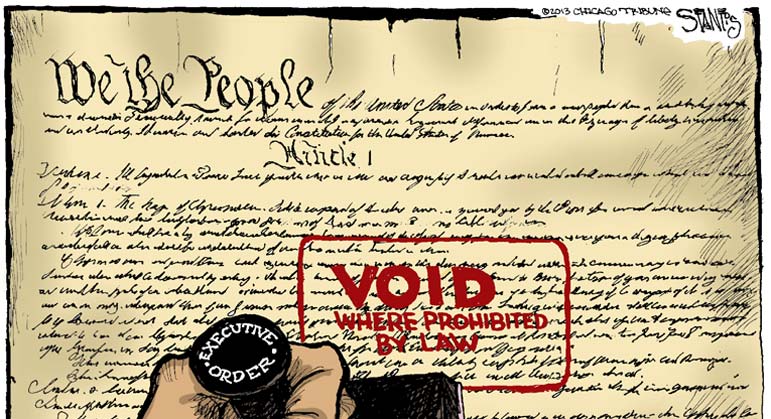
The MSNBC host notes, without any suggestion of self-awareness, that "the Constitution puts a wind at the backs of Republicans and makes them more competitive than they would be otherwise."
What does "otherwise" mean here, exactly? A return to the British Empire? Or does it mean functioning as the centralized direct democracy that progressives covet, but that's never existed in this country? There is no "otherwise."
The idea that the Constitution allows "minoritarian control" might be popular in certain quarters, but it remains a faulty way of looking at our system. The American republic is democratic, yes; but it also protects the rights of the individual, the power of the states and the dignity of the minority, and it does so openly and deliberately.
Federalism, far from representing a modern plot, has existed from the start as a means by which to diffuse power and prevent the subordination of smaller states — read: communities — by bigger ones. There is nothing preventing California from passing whatever laws it wishes at the state level. There are provisions making it hard for California to pass whatever laws it wishes in West Virginia. That's not a bug; it's the point.
To bolster the claim of this minoritarian autocracy, Hayes is impelled to create the impression that the overriding national consensus is being thwarted. "Democrats have established a narrow but surprisingly durable electoral majority, holding control of the House, winning back the Senate, and taking the presidency by 7 million votes," he argues. This is wishful thinking. Voters are fickle and mercurial, and the fleeting vagaries of public sentiment are constantly changing. Four years ago, Republicans controlled everything, too. What has changed? Not much, really.
Perhaps the most dangerous thing about anti-constitutionalists such as Hayes is their inability to comprehend their own authoritarianism. Hayes asserts that, in the future, the national fight will revolve around "whether the United States will live up to the promise of democracy." "On that crucial question," he suggests, "we've rarely been so divided."
But he doesn't really mean "democracy" so much as he means "things I personally like." Rest assured, Hayes wasn't a fan of majoritarian "democracy" when the vast majority of Americans opposed gay marriage. He's not really a fan of catchall "democracy" when it doesn't serve his philosophical interests.
As for "authoritarianism" — well, that also seems to depend upon whose ox is being gored. One can only imagine the kind of raging screeds we'd be subjected to if Republicans were talking about a national domestic-terror act — a Patriot Act for Americans — that was explicitly designed to weed out the left-wing extremists that burned their way through last summer. And how many Hayes-approved protestors do we think would hit the streets if the Biden administration had instructed the military to stand down so it could ferret out thought-crimes?
Forget the hypotheticals: Where are Hayes's passionate objections to President Biden's having signed a slew of acutely undemocratic executive orders — including international agreements — without the consent of the legislative branch? How loud has he been in criticism of Chuck Schumer's imploring the executive to strip Congress of its power? Where was he when the Obama administration went after the conscience rights of nuns? Clearly, for many left-wingers — and, no, it is no longer accurate to call them "liberals" — "democracy" and "authoritarianism" are wholly situational ideas. I won't be lectured by them any longer.
To believe the "Biden era of American politics is shaping up as a contest between the growing ideological hegemony of liberalism, and the intensifying opposition of a political minority that has proved willing to engage in violence in order to hold on to power," one has to ignore reality — starting with the endless supply of leftist riots that broke out across the country last summer to unfailingly rave reviews — and, in concert, to pretend that the Capitol rioters were not only magically "different," but represented the core of the conservative argument.
Well, I won't do either. I'm for the rule of law — as it actually exists, not how others would like it to exist. I am for the Constitution. I am for both houses of Congress. I am for the states. I am for the Bill of Rights. I'm for all those things because I reject authoritarianism.
(COMMENT, BELOW)
Previously:
• 02/05/21: What NOT to Do with Marjorie Taylor Greene
• 01/15/21: Free Speech Is a Value Not Just a Right
• 12/31/20: It Can't Get Any Worse Than 2020. Here's a 2021 Political Wish List
• 10/26/20: Wanted: An Honest Debate about the Death Penalty
• 10/26/20: These are the questions 'Big Guy' Biden must be forced to answer about Hunter's emails
• 09/11/20: The Dems' Dangerous Delegitimization of the Election
• 08/28/20: Biden Is Underperforming Hillary in Battleground States
• 08/14/20: Kamala Harris, Imaginary Centrist
• 07/24/20: Who you calling a fascist?
• 07/17/20: Speech Police have finally gone too far
• 07/03/20: 'But Gorsuch' Is Still Trump's Best Argument
• 06/22/20: Welcome to America's Cultural Revolution
• 06/12/20: The color of my skin is not an indictment of my morality, nor does it strip me of my agency
• 06/05/20: What this son of immigrants knows about bulding bussinesses --- and the dismay of destruction
• 05/28/20: The Folly of Twitter's Fact-Check
• 05/22/20: Dems Warning Trump Will Reject Election Results Should Look in the Mirror
• 05/15/20: Obamagate Is NOT a Conspiracy Theory
• 05/08/20: Really, Joe --- due process is the opposite of justice?


 Contact The Editor
Contact The Editor
 Articles By This Author
Articles By This Author